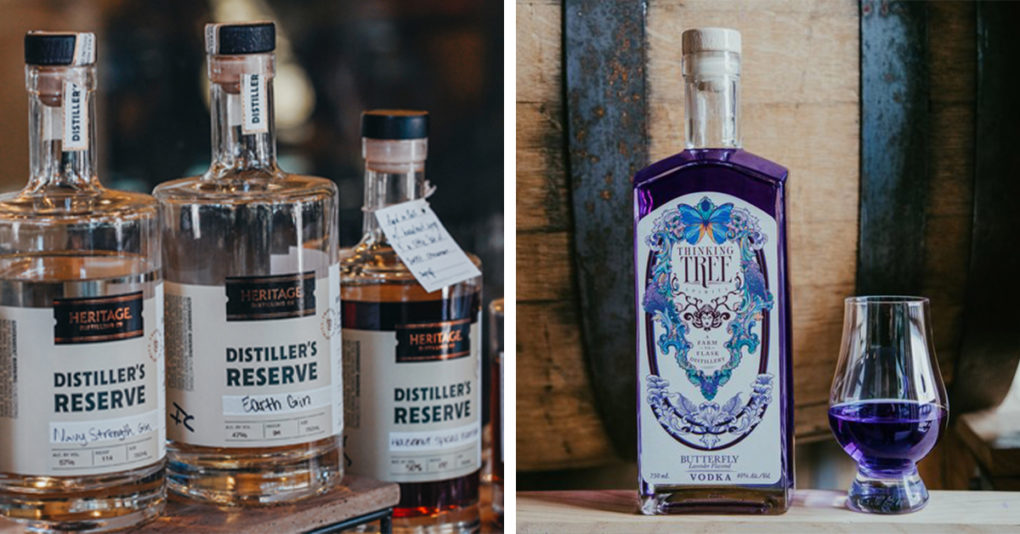
With small and medium-sized craft distillers doing the majority of business inside their home states, the deal represents how some regional brands may leverage local acquisitions to gain a deeper foothold at home and beyond.
“As 2024 moves along and as we move into 2025, I believe there will be opportunities to look at interesting brands that have a loyal following and a strategic foothold, but that are otherwise looking for another route to market,” said Justin Stiefel, CEO and co-founder of Heritage Distilling Co.
Since Stiefel and his wife Jennifer Stiefel opened Heritage Distilling in 2011, the company has grown to offer a variety of craft spirits and accelerated its distribution strategy with the creation of the Tribal Beverage Network, a collaboration with Native American tribes developing Heritage-branded distilleries across the country.
With Heritage now owning Thinking Tree assets and brands, the combined entity includes two production facilities for spirits – one in Tumwater, Washington and the other in Eugene – five retail tasting rooms, a combined online direct-to-consumer presence, growing wholesale distribution across the Pacific Northwest and a number of new states in the Midwest.
Farm-to-flask Thinking Tree Spirits was founded in 2014, but needed to “add authentic craft scale” to grow to its ultimate potential, said the co-founders Bryan Jensen and Kaylon McAlister, in a statement. This meant finding a partner who understood how Thinking Tree’s products should fit in the growing craft spirits’ landscape.
To Stiefel, that landscape is now more than ten years into its initial cycle and may mean changes are ahead. Founders who started their brands together years ago may have found that their visions diverged, or lack access to capital, or are otherwise looking for an exit, he said.
“As distribution consolidates further, smaller brand owners are finding that pathways to growth outside their home markets are getting fewer and more expensive,” he said.
Consolidation has been a theme of the last decade for craft beer, an industry several years ahead of the craft spirit boom that emerged in the 2010s. While the number of craft distillers is still growing, it has begun to slow: from August 2022 to August 2023, the number of active craft distillers in the U.S. grew by 2.4%, a dramatic dip from a 17.4% rise in 2021.
Breweries nabbing nearby competitors has been part of the recent shape of craft beer, but craft-on-craft spirit acquisitions have been more rare. Ole Smokey’s addition of Tanteo Tequila may be the closest in nature last year, but remained a standout in a wave of portfolio additions mostly by strategics or foreign firms buying into the U.S. market.
The Thinking Tree acquisition has another purpose for Heritage: adding new products to its Northeast distribution routes across Alaska and Washington.
Distribution for Heritage products into Oklahoma, Texas, Kentucky and Kansas will begin in the next 60 to 90 days as well, with Thinking Tree brands – currently mainly concentrated in Oregon, with a couple also featured in Texas – likely getting in on those routes, too.
By consolidating all production under Heritage’s distillery in Eugene, Stiefel also expects to see significant improvements in margin and overall profitability. Heritage will start making some of Thinking Trees’ iconic products including Gifted Gin, Butterfly Pea Lavender Vodka, and high proof 375 ml RTDs.
The deal will also help Heritage with its goal of updating its five tasting rooms. In 2023 about 50% of Heritage’s overall revenues were from direct-to-consumer sales, although with larger distribution Stiefel expects that percentage will go down as the company adds wholesale revenue. The company closed a Seattle, Washington tasting room last year citing the decision not to renew their lease.
Heritage intends to move its tasting room activities, samplings, drinks service and its Cask Club program into the existing Thinking Tree building three blocks away.
After the latest walk-through with the architect, the new combined tasting room space will be able to seat close to 90 people indoors at once, said Stiefel. That’s combined with food trucks on site and some expanded menu offerings, plus the combination of the Heritage Distilling book of spirits and the Thinking Tree line. The company expects the tasting room expansion to triple the current footprint, and should be completed by 2024 Memorial Day weekend.
Outside investment dollars were not used to complete the transaction, and terms of the deals were not disclosed.